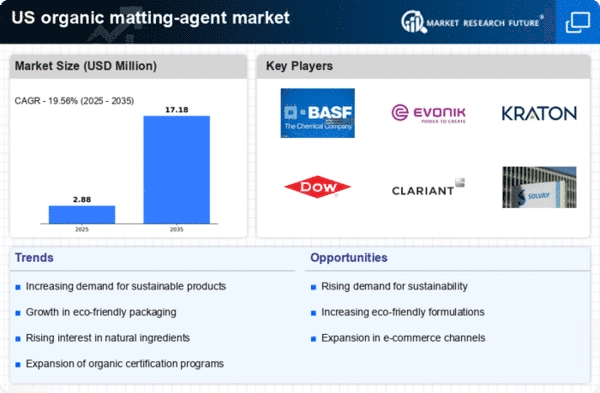Consumer Awareness and Education
Consumer awareness and education regarding the benefits of organic products are crucial drivers in the organic matting-agent market. As consumers become more informed about the potential health and environmental impacts of synthetic ingredients, they are increasingly opting for organic alternatives. Educational campaigns and marketing efforts by brands are helping to raise awareness about the advantages of using organic matting agents, such as their safety and sustainability. This heightened awareness is likely to translate into increased sales and market growth, as consumers actively seek out products that align with their values and preferences.
Growth of the Natural Cosmetics Sector
The organic matting-agent market is poised for growth due to the expansion of the natural cosmetics sector. As consumers increasingly seek products that are free from synthetic chemicals, the demand for natural and organic ingredients is surging. The natural cosmetics market in the US is projected to reach $54 billion by 2027, with a CAGR of 10% from 2022 to 2027. This growth is likely to create opportunities for organic matting agents, which are essential for achieving desired textures and finishes in cosmetic formulations. The alignment of organic matting agents with the clean beauty movement positions them favorably within this burgeoning market.
Rising Demand for Eco-Friendly Products
The organic matting-agent market is experiencing a notable increase in demand for eco-friendly products. Consumers are becoming more environmentally conscious, leading to a shift towards sustainable materials in various industries, including cosmetics, food, and pharmaceuticals. This trend is reflected in the growing preference for organic matting agents, which are derived from natural sources and are biodegradable. According to recent data, the market for organic ingredients in personal care products is projected to grow at a CAGR of 8.5% through 2027. This rising demand for eco-friendly alternatives is likely to drive the organic matting-agent market, as manufacturers seek to align their offerings with consumer preferences for sustainability.
Technological Advancements in Production
Technological advancements in production processes are significantly impacting the organic matting-agent market. Innovations in extraction and formulation techniques have enhanced the efficiency and quality of organic matting agents. For instance, the development of cold-press extraction methods allows for the preservation of the natural properties of raw materials, resulting in superior products. Additionally, advancements in analytical techniques enable manufacturers to better understand the properties and performance of these agents. As a result, the organic matting-agent market is likely to benefit from improved product offerings, which could lead to increased adoption across various applications, including cosmetics and food industries.
Regulatory Support for Organic Ingredients
Regulatory support for organic ingredients is a driving force in the organic matting-agent market. The US government has implemented various regulations that promote the use of organic materials in consumer products. For instance, the USDA Organic Certification ensures that products meet specific standards, thereby enhancing consumer trust. This regulatory framework encourages manufacturers to incorporate organic matting agents into their formulations, as compliance with these standards can lead to a competitive advantage. As more companies seek certification, the organic matting-agent market is likely to see increased demand, fostering growth and innovation within the industry.
















